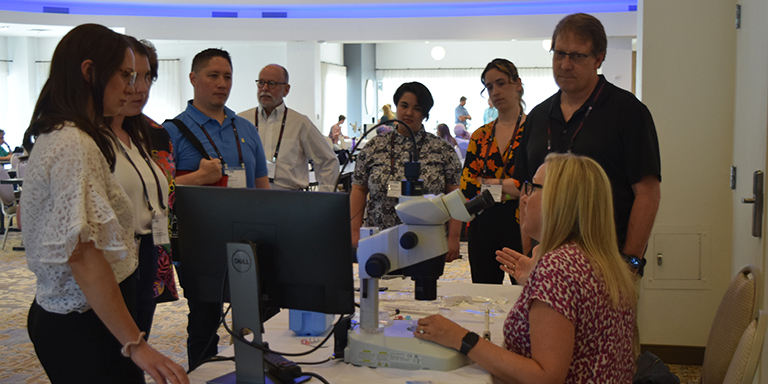
Newsletter
Special Interest Group of the American Association of Bioanalysts (AAB)
A Year in Review: A Legal Perspective
Danielle E. Holley, JD, MS, O’Connell & Aronowitz, P.C
2019 has unfortunately seen a focus on IVF clinics and a myriad of litigations have ensued. First, headlines were made regarding the events in both California and Ohio regarding the cryostorage tank failures. Then, headlines were focused on embryo mix-ups. This article focuses on a year-end review of some of the most prominent legal issues the industry has seen and how the IVF industry can gain insight to avoid such situations and focus on their compliance. The plaintiffs in many of these lawsuits will be looking closely at the operations of the IVF clinics, and it is important that clinics can and should ensure that they have appropriate safeguards, compliance plans, and policies and procedures in place.
Storage Tank Failures
One set of lawsuits of which the IVF clinic industry is keenly aware of are the lawsuits in Ohio and California regarding the malfunctioning of cryosotrage tanks. Several class actions were brought against the IVF clinics on behalf of impacted patients. In both states, the manufacturer of the storage tanks are also included as a party, and in Ohio, the company responsible for monitoring the alarm system has been brought in. The cases in Ohio, are under a gag order and many court documents are under seal. In Ohio, 8 additional lawsuits have been filed in addition to the current class action, which is made up of 70 other lawsuits.
The common thread amongst these class actions involved several legal causes of action, including breach of contract, negligence/gross negligence, bailment, breach of fiduciary duty, breach of implied warranty of fitness for a particular purpose, deceit and fraudulent concealment, and violations of the unfair competition law, among others.
A few of these are standard causes of action, such as breach of contract and breach of fiduciary duty, but a few shed insight to the key factors targeted in these lawsuits. For example, the plaintiffs have alleged that the clinics have committed negligence and/or gross negligence. With this cause of action, plaintiff have alleged that the IVF clinics have failed to adequately maintain, inspect, and monitor the storage tanks. Plaintiff’s also allege that defendant failed to establish, maintain, and properly activate alarms and autofill devices. They also allege failure to use reasonable care, failure to follow reasonable scientific and laboratory procedures for safeguarding, and failure to safeguard eggs and embryos in their care. Plaintiffs have also asserted a cause of action for bailment. Here, plaintiffs have alleged that defendants failed to return eggs and embryos to clients in a viable or usable condition. Plaintiff’s also allege that the IVF clinic breached its duty to exercise care in maintaining, preserving, and protecting the eggs and embryos that they had a duty to return to plaintiff’s undamaged.
Additional causes of action brought are the breach of implied warranty of fitness for a particular purpose and deceit and fraudulent concealment. Here, plaintiffs are focused on the knowledge and expertise of the clinics, and how an IVF clinic holds themselves out to the public. More particularly, plaintiffs have alleged that they relied on the clinics skill and judgment to store and maintain their eggs and embryos and to ensure that those eggs and embryos would be delivered back to them in a viable condition and the clinics failed to meet industry standards.
In looking at the cases, a few important issues have been highlighted. Some important things to consider in the context of storage tanks are as follows:
- Have a backup plan such as backup generators to run the tanks in the event of a power outage.
- Ensure that laboratory staff are trained and know how to adequately use the tanks.
- Provide further training in the use of liquid nitrogen.
- Ensure that the alarm systems on each storage tank are in good working condition and have them tested weekly.
- Ensure all laboratory equipment is checked regularly and is in good working condition.
- Have back up storage tanks and enough additional liquid nitrogen on site to fill those tanks if necessary.
Embryo Mix Up
Another headliner of lawsuits in the IVF industry are the variety of lawsuits regarding embryo mix ups. A New Jersey couple is now suing the New Jersey Clinic two years after giving birth to their child whom does not share the DNA of her father, and a New York couple as well as a California couple are suing the California Clinic for the mix up of their embryos.
Here too, there is a common thread of causes of action, with some mirroring those seen in the storage tank failures. The overall thread of common causes of action include claims for medical malpractice, negligence, negligent infliction of emotional distress, breach of contract, breach of the implied covenant of good faith and fair dealing, conversion, deceit and fraudulent concealment, among others. All of these focus on industry standards, the purported expertise of the clinic, monitoring, and the policies and procedures in place to prevent such occurrence.
The lawsuits also focused on the marketing campaigns by each of the clinics and how they held themselves out to the public. Phrases used by the clinics were actively cited in the lawsuits to further claims that the clinic had even more expertise and to attempt to lay a foundation for the plaintiffs’ causes of actions.
Other Issues, Legislation and Cases
While the recent cases in the embryo mix up have been obvious differences to raise concerns, such as the couple being told they would have females but had boys, or had children of a different national heritage, some commentators are starting to question whether this happens more often and goes unnoticed. In the advent of more and more direct to consumer genetic testing, the open question is whether the public will use these tools to second-guess the process.
There is also an increasing number of medical malpractice cases focused on genetics in reproductive medicine, whether related to carrier screening, PGT or other such potential gene-editing technology.
Another looming issue from these cases is the requirement of the clinics to turn over lists, potentially, of anonymous sperm donors. In one such case, a couple sued the IVF clinic once it was determined by genetic testing that the father revealed no genetic traits with the child, and the judge ordered the fertility clinic to hand over a list of sperm donors.
Retention of information related to gamete banks and donors is another issue of focus. In California, the Governor recently signed into law, Assembly Bill No. 785 that requires additional collection and retention of information for gamete donors. It was already required by California law that any gamete bank licensed in the state of California that collected gametes on or after January 1, 2020, collect and maintain particular identifying and medical information of gamete donors. Some examples of such information are the gamete donor’s name, date of birth, and address. The regulation now requires the gamete bank to obtain any other contact information of the donor at the time of their donation as well as records of gamete screening and testing, and to obtain such information for any gametes it receives by another gamete bank. The new law also changes how information will be listed on a certificate of live birth.
The last issue that is gaining traction this year are state “fertility fraud” laws. Texas incorporated their fertility fraud law in the state’s sexual assault law, while Indiana has created a specific criminal law to address misrepresentation of human reproductive tissue. California also recently passed a criminal law to address it based on lack of consent.
It’s been a busy year for the IVF world, from lawsuits to new legislation abounding. A careful look and, at minimum, an annual review of one’s policies, procedures and training may be in order.
Danielle E. Holley, JD, MS, O’Connell & Aronowitz, P.C
2020 CRB Symposium and WorkshopCRB News Articles
12/23/2019
Vol 8, No. 3
12/23/2019
A Year in Review: A Legal Perspective
12/23/2019
2020 CRB Symposium and Workshop
Save The Date:
2020 CRB Symposium – May 7-9, Orlando
CRB Standing Rules - Log in to view



